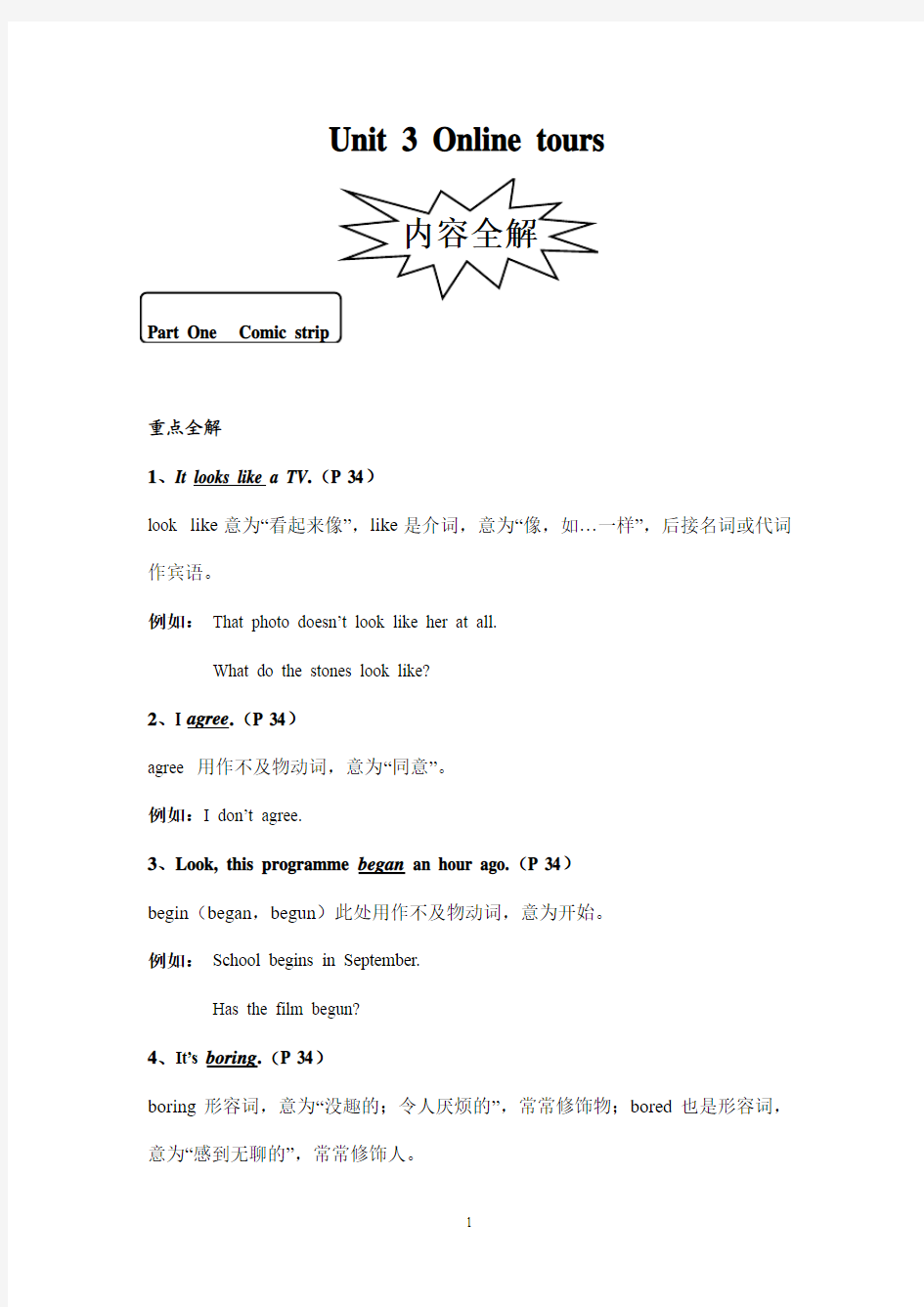译林版牛津英语8B全册八单元知识点整理及单元测试卷:8 B Unit 3 Online tours


Unit 3 Online tours
内容全解
Part One Comic strip
重点全解
1、It looks like a TV.(P 34)
look like意为“看起来像”,like是介词,意为“像,如…一样”,后接名词或代词作宾语。
例如:That photo doesn’t look like her at all.
What do the stones look like?
2、I agree.(P 34)
agree 用作不及物动词,意为“同意”。
例如:I don’t agree.
3、Look, this programme began an hour ago.(P 34)
begin(began,begun)此处用作不及物动词,意为开始。
例如:School begins in September.
Has the film begun?
4、It’s boring.(P 34)
boring形容词,意为“没趣的;令人厌烦的”,常常修饰物;bored也是形容词,意为“感到无聊的”,常常修饰人。
例如:The film is very boring.
Everyone feels very bored.
Part Two Welcome to the unit
A
重点全解
1、send and receive emails.(P 35)
①send此处作及物动词,意为“送,发送,寄出”
send sth. to sb.= send sb. sth.
例如:I’ll send my grandfather a hat on his birthday.= I’ll sen d a hat to my grandfather on his birthday.
②receive及物动词,意为“收到,接到”
例如:Did you receive the letter from your pen pal?
receive 收到,接到强调客观上收到
accept 接受强调主观上接受
2、I usually use it to search for informatio n. (P 35)
①use sth. to do sth.意为“使用某物做某事”,相当于use sth. for doing sth.
例如:They use the sun to heat water.=They use the sun for heating water.
②search用作不及物动词,意为“搜寻,寻找”
例如:It was too dark to search further.
③search for意为“搜寻,寻找”,相当于look for,后面跟要找的对象作宾语
3、Almost every day.(P 35)
Almost副词,意为“几乎”,一般放在实义动词之前,助动词、连系动词be之后。例如:I tried to understand it,but it was almost impossible.
Helen had a bad cold. She almost lost her voice.
Part Three Reading
重点全解
1、Welcome to “Around the World in Eight Hours”. (P 36)
welcome作感叹词,意为“欢迎”。welcome to表示“欢迎来到…”
例如:Welcome to China.
Welcome to our school.
2、Have you noticed the “Tour” icon at the top of the page. (P 36)
Noticed是动词notice的过去分词。Notice此处用作及物动词,意为“注意,注意到”。notice后接名词,也可接从句。
例如:Did you notice the man in black?
I noticed that you had made great progress.
3、Further on is Times Square. (P 37)
further在此作副词,意为“更远,较远”。,是far的比较级。
例如:He walks a little further.
further 副词指在距离She’s too tired to go any further.
方面“更远,较远”她太累了以至于不能再往前走了。
形容词表示抽象
意义,指程
度上“更
多,更进一
步,更深一
层”
If you need any further help,
please call us. 如果你需要进
一步的帮助,请给我们打电话。
Many parents send their
children to foreign countries for
further study. 很多家长送孩子
去国外深造。
farther 形容词/副词只表示距
离上“更
远,较远”
I can’t go any further.我再也走
不动了。
4、Every year,thousands of people gather here on New Year’s Eve. (P 37)Thousands of意为“成千上万的,数以千计的”。在表示“成百上千的”“成千上万的”“数以百万的”等不确切的数量时,用hundred(百),thousand(千),million (百万)等词的复数形式加介词of。此时前面不能再加基数词或冠词。
例如:Thousands of people came to the island last year.
The boy has read hundreds of books.
5、It’s exciting to see the huge glass ball falling through the darkness. (P 37)
①huge形容词,意为“巨大的”。
例如:There is a huge building near the river.
huge
一般表示体积大,常用于指程度、数量、规模
等,不强调重量
big
指面积、范围、重量或体积等是“大的”,常用
于口语中,修饰人或物
large 侧重指数量、容积、体积或面积之大,一般不用于指人。修饰物时,能和big互换,但比big 正式
great
常指抽象的事物,带有主观色彩。可表示数量、
距离、距离或程度,修饰人时,意为“伟大的”
②fall(fell,fallen)用作不及物动词,意为“落下,跌落”
例如:One of the birds fell into the river.
6、With several lakes, hills and a large green lawn, it’s a good place to relax after
a hard day’s work. (P 37)
①句中的with several lakes,hills and a large green lawn为介词短语,with的意思是“带有;伴随”。
②several此处用作形容词,意为“几个,数个”。several修饰可数名词复数形式。
③relax此处用作不及物动词,意为“放松”,它也可以作及物动词。Relax 的形容词为relaxing意为“令人放松的”,relaxed意为“感到放松的”。
例如:You can relax by listening to music.
I felt relaxed after watching the relaxing TV play.
④hard此处用作形容词,意为“辛苦的,艰难的”。
例如:They did hard work every day.
7、It has been famous for its theatres since the early twentieth century. (P 37)
①be famous for意为“因…而著名”,后接表示人或事物某方面的特点、特长等的名词。
例如:Mr. White is famous for his novels.
拓展be famous as意为“作为…而闻名”,后接表示身份、职业等的名词
②the early twentieth century意为“20世纪初期”。表示“20世纪晚期”用the late twentieth century
8、It comes from the famous Broadway musical Cats. (P 37)
musical此处用作可数名词,意为“音乐剧”。
例如:Now more and more people like to watch musicals.
拓展musical用作形容词,“音乐的,悦耳的,有音乐天赋的”
例如:Their children are musical.
9、…pick another city and then start your new tour.(P 37)
①start此处用作及物动词,意为“开始”,后接名词作宾语。start后还可接动词不定式或动名词形式,表示开始做某事,两者在用法上没有明显区别。
例如:My father started to work when he was sixteen years old
He started learning English in 2001
②tour此处用作可数名词,意为“旅行”
10、.a play filled with many songs(P 38)
①play此处用作可数名词,意为“戏剧,剧本”
例如:Some people don’t like watching plays.
②be filled with是固定短语,意为“装满…;充满…”,其中filled是动词fill的过
去分词。fill意为“填满,充满”,它的形容词形式为full(满的),fill与full的反义词都是empty(倒空;空的)。be filled with相当于be full of,其主语通常为物。例如:The cup is filled with water.=The cup is full of water.
拓展fill…with… 意为“用…把…装满”
例如:Please fill my cup with water.
11、more than two(P 38)
more than意为“超过,多于”,相当于over。More than的反义词组为less than,意为“不到”。
例如:We planted more than one hundred trees.
The young man is less than twenty years old.
12、New York is also called “the Big Apple”. (P 39)
这是一个被动语态的句子,谓语is called意为“被叫做”。英语中有两种语态,即主动语态和被动语态。主动语态表示主语是动作的执行者,被动语态表示主语是动作的承受者。被动语态谓语动词的构成为“be+及物动词的过去分词”
例如:Many people speak English.
主语谓语动词宾语
English is spoken by many people.
主语be+过去分词by+主动语态中的主语
13、There are no hills or lakes in Central Park. (P39)
no此处用作形容词,意为“没有”,可修饰可数名词或不可数名词。
例如:We found no students in the classroom.
14、That sounds great.(P39)
Sound此处用作连系动词,意为“听起来”,后面常接形容词作表语,有时也可接介词like,sound like意为“听起来像”
例如:The story sounds boring.
Part Four Grammar
重点全解
1、Have you ever dreamt of travelling around the world without a passport. (P 42)
①此处dreamt是dream的过去分词,dream此处用作动词。
dream用作动词时,主要有以下含义:
(1)做梦,梦见,梦到(常和of/about连用)
例如:I dreamt of/about you.
(2)向往;渴望;想象
例如:That boy dreams of becoming a pilot.
②travel around the world环游世界
③without介词,意为“没有”,之后要接名词、代词或动名词。由它构成的介词短语常位于句首或句末作状语。
例如:Man can’t live without water.
2、Yes, you can realize your dream by taking an online tour. (P 42)
by taking an online tour意为“通过进行一次在线旅行”,by此处表示“通过…,靠…
